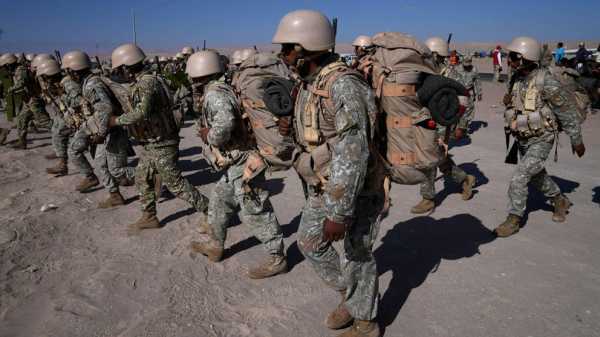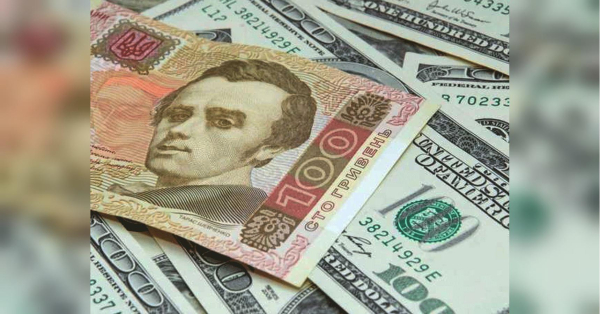
TACNA, Peru — Stranded for five days under the scorching desert sun alongside a highway, Venezuelan Rosmary Morales looked on helplessly Friday at a wall of police officers blocking her passage into Peru.
The 45-year-old waits alongside hundreds of others who have set up a makeshift refugee camp on the Chilean side of the border they can’t cross because they lack the proper documentation. “There isn’t even an awning,” Morales said, adding she felt she was being treated “like a dog.”
Morales is among the Venezuelans, Colombians and Haitians stranded for two weeks along the Peru-Chile border, eager to return home as living costs skyrocket and as lawmakers in both countries propose penalties for undocumented migration.
Political leaders, meanwhile, are discussing how to facilitate their passage through Peru at a time when migrants increasingly are being blamed for rising crime on both sides of the border.
Chile said Friday it would start registering all the undocumented migrants who want to leave the country, and Peru started letting some of them through to its border offices.
Morales says that while she’s grateful that Chile took her in when she left Venezuela, she’s now ready to go back to her native country because the cost of living has risen, jobs have become scarce and she’s finding it difficult to survive without the proper documentation, which she says has been impossible to obtain.
“We can no longer make ends meet,” Morales said.
Now she and others are having to endure the elements at the Atacama Desert, one of the driest on the planet, with heat during the day and cold at night.
“Many mothers are there, with children, with the flu, fever, constant vomiting, dehydrated, unable to eat a good lunch, unable to bathe,” Morales said.
Chile’s acting interior minister, Manuel Monsalve, said Friday the government will set up registration points in the border region to enroll undocumented migrants who want to leave the country so “their fingerprint, face and name can be recorded.”
Monsalve said Chile wants to let the migrants “return to their country” but also noted it’s the government’s responsibility to ensure that “people who have committed crimes are not leaving Chile.”
The president of Chile's lower house of Congress, Vlado Mirosevic, had proposed Thursday that a “humanitarian corridor” be created to allow the migrants to return home, without elaborating on details of such a corridor.
Peruvian Interior Minister Vicente Romero said on Friday on local radio RPP that “at the level of the foreign ministry, we are working with Chile, Ecuador, and also with Venezuela” to find a way for migrants to cross borders without problems.
“The important thing is to provide the necessary security to all foreigners who voluntarily wish to return to their country,” Romero said.
Romero, who has been in the Peruvian border region with Chile since Thursday night, added that he met with local authorities to consider opening “temporary shelters” for people waiting to leave.
Migrants have set up improvised tents with blankets and braved the elements without access to running water and other basic services. Others have found help in the nearby Chilean border complex of Chacalluta.
“We want to go back to our country, Venezuela. We’ve achieved what we came to do in Chile," Omar Domínguez, 47, said at the border. “We don't want to stay in Peru."
According to official figures from Chilean prosecutors, approximately 10,000 undocumented immigrants have entered Chile this year, and an additional 1,194 have requested to leave.
The crisis along the border comes at a time when officials in Chile are increasing controls on undocumented migrants. Earlier this month, Chile's National Prosecutor’s Office called on prosecutors to request preventive detention for anyone caught committing a crime who could not prove their identity.
In both Peru and Chile, lawmakers are seeking to toughen laws against undocumented migrants.
A measure set to be debated in Chile’s lower house of Congress would classify undocumented immigration as a crime and proposes jail sentences up to 18 months for anyone caught entering Chile through unofficial channels.
In Peru, a lawmaker from the Somos Perú party proposed a bill Thursday to imprison migrants who enter the country illegally for up to 10 years. A lawmaker from the far-right Renovación Popular said Peru’s border patrol should enjoy legal protections so they can “shoot” migrants if necessary.
Peruvian President Dina Boluarte attributed “criminal acts” to migrants earlier this week. —– Associated Press journalists Franklin Briceño in Lima, Peru and Eva Vergara in Santiago, Chile contributed to this report.
Sourse: abcnews.go.com






